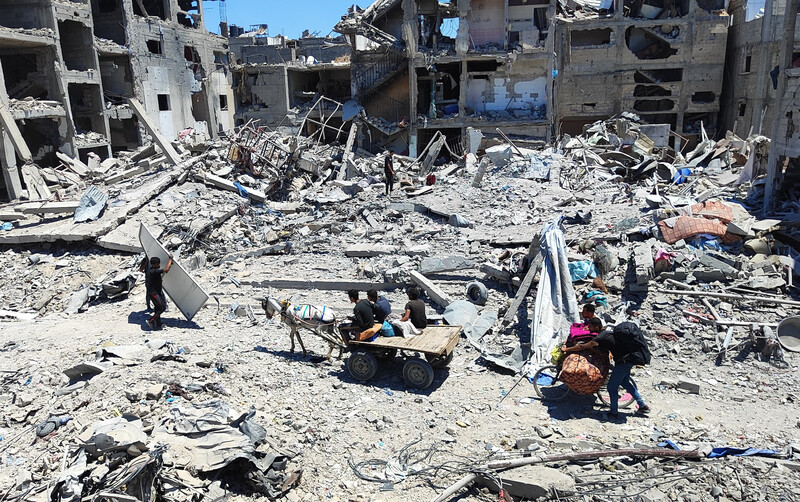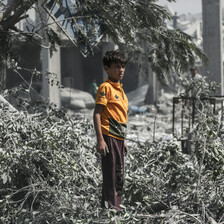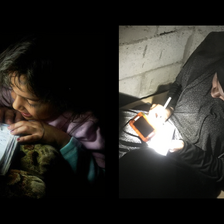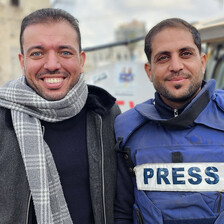The Electronic Intifada 19 September 2024

Palestinians return to their homes after the withdrawal of Israeli forces following a three-week attack in Jabaliya refugee camp, northern Gaza, 31 May.
APA imagesA friend of mine rang me recently.
Months had flown by and I hadn’t heard from him, nor did I get a chance to call him after the war began, although we live only a few kilometers apart from each other.
He told me he is with his family in the south, going through another round of what the Western press simplistically refers to as “evacuation” – a term we recognize as yet another instance of displacement and escaping death before the housing unit, building, camp, hospital or school we are expelled from is leveled to the ground.
Since we hadn’t spoken in months, we spent the first half of our conversation exchanging condolences over friends and family lost during the last 12 months. Some were killed point blank by the Israeli military, others in airstrikes or by tank shelling. Then there are others who were arrested and detained by Israel and their fate as weeks turned into months remain unknown.
The second half of the conversation was a tad bit more light-hearted as we turned over to the subject of his family and his young daughter, Marah, Arabic for “joy.”
Given unfolding events, she sounded anything but joyful. “Oh uncle Asem, it’s so hot here in the tent, it wasn’t like this before,” she told me. I was not entirely sure what she meant by “before,” as no one was living in tents in Gaza prior to the war. But not wanting to interrupt her, I did not ask what she meant and instead kept listening to what she had to say.
Marah went on to explain the hardships, inconveniences and lack of privacy that come with living in tents. From insects to dripping water from rain, she explained the need to “keep your voices down when talking because the tent fabric is so thin we can hear our neighbors while they can hear us just the same.”
She added that “the only time you should not whisper is when you are telling a joke, so everyone nestled in all different directions of your tent can share a laugh” – an important piece of advice much needed in trying times like this.
We humans are often conditioned to think there is good and bad, ease and hardships. I therefore asked Marah if there was something nice about living in a tent. She paused for a moment, had a good think and replied:
“The only time it is fun to live in a tent is before the war when we went to the beach and had our picnics in Gaza. Right now, there is nothing nice about it. Even the north is being bombed a lot and there is no food to eat.”
Severe hunger, unrelenting blockade
As she spoke, a part of me wished I could tell her the south is not exactly a bed of roses. The south may have better access to meager humanitarian aid but it is similarly lined with an ocean of tents and people forcibly displaced living in extremely cramped spaces with total strangers.
Meanwhile, here in the north, we have severe hunger and an unrelenting blockade and not much of anything else. Both are trials I would not wish on my worst enemy.
Our grandparents often spoke about the tent as a symbol of suffering they endured during the forced displacement in 1948, or what is known as Nakba (The Catastrophe). Today, 76 years later, the suffering continues, and the tent remains a symbol of unending pain for us Palestinians.
Back then, the tents came almost exclusively with the United Nations logo. Today, a wide range of donor countries are similarly doing nothing else but have donated tents of varying sizes and specifications to house the pain, discomfort and multigenerational suffering of the Palestinian people.
By design, tents are meant to be a temporary shelter, not somewhere you would live for more than a few days or weeks at the most. Yet hundreds of thousands of Palestinian families have rotated from tents to UNRWA schools to sleeping in the streets for a few days before moving right back to square one, in a loop.
As bad as the tent sounds, it is not the worst day-to-day worry for ordinary Gazans. We wake up knowing we may not live to see the sunset and we say our goodbyes to each other at night before going to sleep, knowing we may not see another dawn should there be an overnight airstrike.
Should we survive the night, we wake up hungry, not knowing where food is going to come from. Imagine spending days without eating a morsel. It is hard to, unless you have spent months living or rather surviving like this yourself. In fact, the most sought after food in Gaza is an egg, let alone bread. Meat, meanwhile, is for a parallel universe galaxies away from Gaza.
Children go to bed hungry, wake up hungry and have suffered greatly due to this cruel campaign of starvation. Those who are sick, on a special diet for health reasons or suffer from low blood sugar are either at severe risk or have already died. Mothers have skipped meals to conserve scraps of food for their children. Sure, we are hungry because there is no food. But when there is food, we can’t swallow because we know there is always someone else out there who is starving.
War food
Sharing a meal of canned food, a prized possession in the north, with my family a few weeks ago, my sister suggested we not call the food item by its original name. While we remain grateful for the portion of food that could easily fit into the palm of a child’s hand, she suggested “we preserve our memories, so we can remember that our food was once delicious and that this phase is just temporary, not worth calling anything but war food.”
Meanwhile, the widespread use of the word “famine” is also deceptive, as if crops and agriculture have stopped growing. There is limited agriculture, farming or crops in Gaza these days but most of what Gaza eats comes in the form of humanitarian aid, the flow of which has been severely restricted by Israel.
The problem, therefore, is not what the world calls famine but what the world doesn’t call out as deliberate starvation. There are no vegetables, fruits, meats, poultry or eggs. Just canned food and flour. It’s systematic and intentional. Don’t let the mainstream media make you believe otherwise.
In the end, if the artillery tank shells, snipers, drone and aerial bombs don’t kill us, the starvation, malnourishment and spread of disease will. Like the indiscriminate bombs that kill anyone in its radius, pregnant women, newborns, infants, young children, older people, the sick and the wounded are the likely victims, regardless of whether in the north or the south.
At the end of my call with lovely Marah, she said, “Uncle Asem, after the war ends, you should invite us for a delicious meal in our tent.”
So simply, she merged two great sufferings – my struggle with hunger in the north and her displacement in a tent – into one seemingly cheerful request. She may not have intended it, but her message, tinged with painful hope, is what unites Gazans today and drives us to endure in the face of death, displacement, hunger and every hardship that surrounds us.
Asem Alnabih is an engineer and PhD researcher from Gaza. He currently serves as a member of the emergency committee and as the spokesperson and director of public relations and media at the Gaza Municipality.





